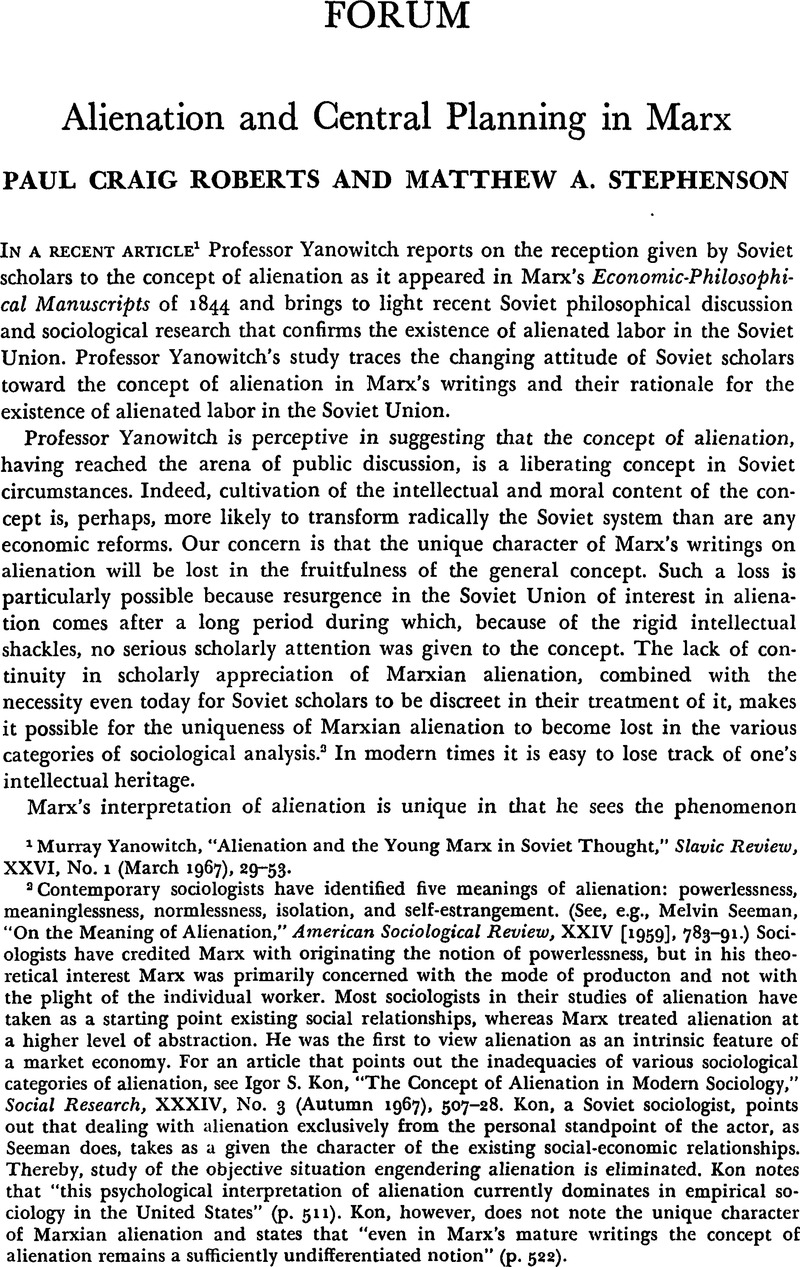Published online by Cambridge University Press: 27 January 2017

1 Murray Yanowitch, “Alienation and the Young Marx in Soviet Thought,” Slavic Review, XXVI, No. 1 (March 1967), 29-53.
2 Contemporary sociologists have identified five meanings of alienation: powerlessness, meaninglessness, normlessness, isolation, and self-estrangement. (See, e.g., Seeman, Melvin, “On the Meaning of Alienation,” American Sociological Review, XXIV [1959], 783–91.CrossRefGoogle Scholar) Sociologists have credited Marx with originating the notion of powerlessness, but in his theoretical interest Marx was primarily concerned with the mode of producton and not with the plight of the individual worker. Most sociologists in their studies of alienation have taken as a starting point existing social reladonships, whereas Marx treated alienation at a higher level of abstracdon. He was die first to view alienation as an intrinsic feature of a market economy. For an article that points out die inadequacies of various sociological categories of alienation, see Kon, Igor S.,” The Concept of Alienation in Modern Sociology,” Social Research, XXXIV, No. 3 (Autumn 1967), 507–28Google Scholar. Kon, a Soviet sociologist, points out that dealing with alienation exclusively from the personal standpoint of tiie actor, as Seeman does, takes as a given die character of the existing social-economic relationships. Thereby, study of the objective situation engendering alienation is eliminated. Kon notes that “this psychological interpretation of alienation currently dominates in empirical sociology in the United States” (p. 511). Kon, however, does not note the unique character of Marxian alienation and states that “even in Marx's mature writings the concept of alienation remains a sufficiently undifferentiated notion” (p. 522).
3 Fromm, Erich, Marx's Concept of Man (New York, 1961), p. 1961 Google Scholar. Similarly, Bell, Daniel writes in The End of Ideology (Glencoe, 111., 1960)Google Scholar that alienation as treated by Marx is “a consequence of the organization of work, and to end alienation one must examine the work process itself” (p. 364). Marx writes that “although private property appears to be the basis and cause of alienated labor, it is rather a consequence of the latter” (“Alienated Labor,” in Economic and Philosophical Manuscripts; reprinted in Fromm, p. 106).
4 As Lenin expresses it in State and Revolution, “the whole of society will have become one office and one factory” ([New York, 1932], p. 84; “Little Lenin Library,” Vol. XIV).
5 Yanowitch points out that Soviet scholars have recognized that the concept of alienation appears in Marx's later writings in the form of “more precise concepts” such as the concept of commodity fetishism (pp. 41 and 45).
6 Marx, Karl, Capital, Vol. I (New York, 1906)Google Scholar, Chap. 1 (Modern Library).
7 “To produce commodities he must produce, not use-values merely, but use-values for others—social use-values” (Capital, Vol. I, trans. Eden and Cedar Paul [London, 1957], p. 9).
8 Capital, I, 97 (Modern Library).
9 Capital, Vol. III, trans. E. Untermann (Chicago, 1909), p. 962.
10 Sweezy, Paul, The Theory of Capitalist Development (New York, 1964), p. 36.Google Scholar
11 Capital, I, 93 (Modern Library).
12 Sweezy, p. 40.
13 Marx, Capital, I, 88-89 (Modern Library).
14 “A man who has a direct obligation to another, as a serf does to a master, knows directly the source of power over him. But one who sells his labor power for money may feel himself to be free. The product of the laborer can thus be easily ‘abstracted’ into money and, dirough the exchange system, be ‘abstracted’ from him” (Bell, p. 341). Cf. Sweezy, p. 39.
15 Capital, I, 90 (Modern Library).
16 Engels, Frederick, Anti-Duhring (2nd ed.; Moscow, 1959), p. 427.Google Scholar
17 Quoted in Kaufman, Adam, “The Origin of the Political Economy of Socialism,” Soviet Studies, IV, No. 3 (Jan. 1953), 245.Google Scholar
18 Capital, Vol. II, trans. E. Untermann (Chicago, 1933), p. 412.
19 See Polanyi, Michael, The Logic of Liberty (Chicago, 1951), pp. 126–33 Google Scholar. In protesting the whitewash of “war communism” as something designed to cope with war rather than an attempt to establish socialism, A. Yugoff quotes from Lenin when he writes: “The attempt to organize Russian economic life upon the basis of war communism was described by Lenin in the following terms: ‘We made the mistake of deciding upon an immediate transition to communist production and distribution We counted (or, to speak more accurately, we assumed without counting) upon our ability to organize a system of nationalized production and nationalized distribution communistically in a petty-bourgeois country by means of a direct command on the part of the proletarian State. Life has shown us our mistake In the spring of 1921, on the economic front, our attempt at the transition to communism sustained a defeat more serious than ever before’ “ (Economic Trends in Soviet Russia [New York, 1930], p. 42). Bell writes that the Marxian conception of money “was the basis of the effort of the Bolsheviks, in the first days of the Revolution, to abolish money altogether” (p. 341).
20 For the development of this thesis see Paul Craig Roberts, “Oskar Lange, Hierarchy, Polycentricity and the Soviet Economy,” paper read at the thirty-seventh annual conference of the Southern Economic Association, session on “The Economics of Central Planning,” New Orleans, Nov. 16, 1967. This paper has been published by the Czechoslovak Academy of Sciences in translation in VMecki Informace, No. 3-4, 1968, pp. 113-44, and is forthcoming in revision in the Journal of Law and Economics as “The Polycentric Soviet Economy.“
21 As expressed by Engels in Anti-Dühring, men “with full consciousness will fashion their own history.“